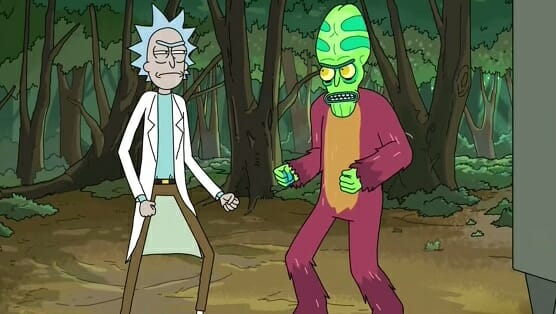
Sentient life is a tricky thing.
You see, I’m an atheist. Always have been. It wasn’t a thing where I had a bad experience one day and stopped believing in God—God was just never a part of my life. The idea of a creator is something I can’t even wrap my head around. A being so narcissistic and powerful that he’d need to make life in his own image and have them serve him? Who could imagine someone like that?
Turns out Rick is exactly that kind of person.
In “The Ricks Must Be Crazy,” we find out that Rick’s car is powered by a microverse that he engineered and has tricked into outsourcing 80% of their power to turn his spacecar’s engine. When the car won’t start, he travels there to find out their head engineer has done the same to a universe he’s created, which in turn has created a teenyverse that does the same.
This scientist, Zeep Zanflorp, voiced here by Stephen Colbert, is more or less Rick’s equal, at least in a lack of morality. When Morty objects to Rick’s method of powering his car as “slavery with extra steps,” he scoffs, but then repeats those exact words when Zeep pitches his miniverse plan to him.
The problem in Rick and Zeep’s individual plans is that they don’t actually value the life they create at all. This is what scares me about the concept of God—what if he just doesn’t give a fuck? What if the all the typing I do and all the walking and all the trains I take are just to start some asshole’s car? It’s comforting to just believe life is arbitrary because if it isn’t, but is still meaningless, well, what the fuck would I do? What if God is just punking me? What if God is Ashton Kutcher? A scientist on Zeep’s miniverse has to confront that. His father died, and he missed the funeral because he was too busy constructing the teenyverse.
In the meantime, Summer’s been locked in the car and it’s been instructed to keep her safe. I like how much more Summer’s been involved this season—her open mindedness combined with her Earth-centric morality has been a welcome counterpoint to even Morty’s relatively blasé approach to Rick’s shenanigans. While the car can easily go to any measure to keep her safe, Summer demands that it stays non-lethal. What occurs because of this request is hellish—it paralyzes someone, it clones a police officer’s son and then kills it as a warning, and then, finally, it brokers peace among that universe’s humans and a race of giant spiders.
What Rick and Morty ultimately says about humanity is that our ideas of right and wrong are too constrictive. There are a thousand rights and wrongs in any given situation. There are ramifications our actions will have that we can barely understand. In the end, knowing how Rick manipulated his entire race, Zeep keeps powering Rick’s car. Would it be right for him to have found an alternative power source? Would it have been ethical? Is anything ethical? Can we really know that?
Can human beings do things without harming anything else? Because of the peace between the humans and the giant spiders, all the ice cream now has flies in it.
Gita Jackson has dedicated her entire adult life to wading through the marginalia of popular culture and finding gold.